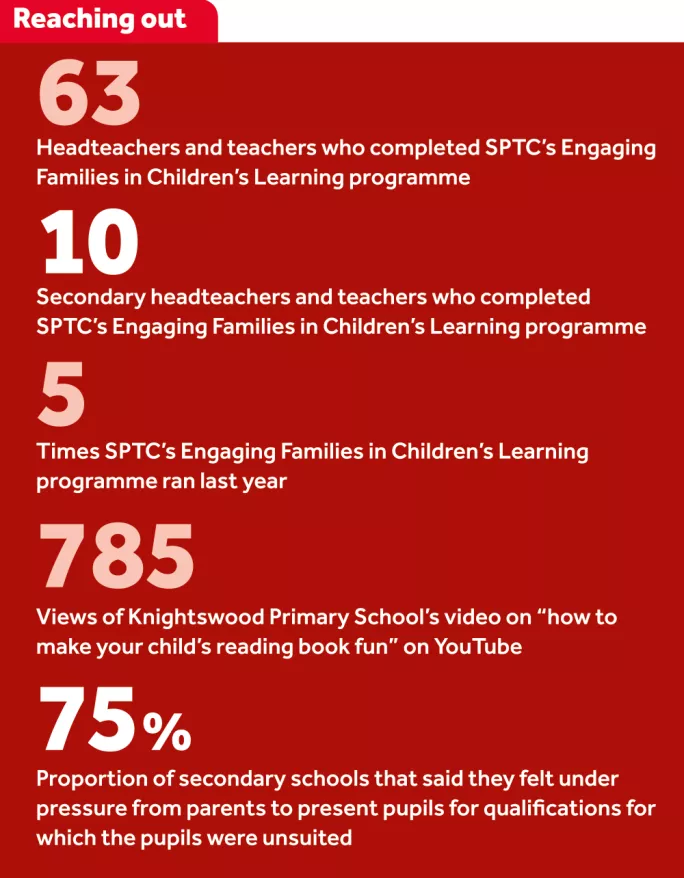Could better engagement end the battle over National entry?

Parents and schools would not get locked in battles over which qualifications children should be presented for if schools cultivated better relationships with families, a parents’ organisation has said.
The remarks come after almost three-quarters of secondary schools revealed they felt under pressure from parents to present pupils for qualifications they were unsuited for, in a recent report from exam body SQA.
The report also said nearly all teachers felt pressure “to a greater or lesser extent” to present learners for the more advanced National 5, despite evidence indicating National 4 would be more appropriate. It added the pressure came “from parents and carers mainly”.
However, Eileen Prior, chief executive of the Scottish Parent Teacher Council, highlights another statistic from that report: only a quarter of schools said they used communication with parents and carers or learners to determine the appropriate level of presentation. She suggested it is no coincidence that roughly the same proportion of schools also reported they felt little or no pressure “to present at a level they did not feel was appropriate”.

“It’s about mutual trust and understanding and shared endeavour - being in this together to do the best for the child,” Ms Prior said.
Ms Prior made her comments as the Scottish Parent Teacher Council revealed it had been given the green light to continue delivering training for schools on engaging with parents for a second year. The programme - called Engaging Families in Children’s Education - has been accredited by the Scottish College for Educational Leadership and reached more than 60 headteachers and teachers last year (see graphic, above), plugging an important gap in teachers’ knowledge, said Ms Prior.
‘Effective engagement is critical’
She said: “Effective parental engagement and the need to evidence the impact of that engagement are absolutely critical for our educators if we want to improve outcomes for children in our education system - yet this is not addressed in teacher education or, until now, in leadership development.”
But effective engagement meant thinking beyond the parent council, she added.
“What we tend to do is get parents in to do things with them - we get them in to parents evening, transition evening, careers evening. But the challenge is engagement,” Ms Prior said.
Since 2015, the SPTC has been working on introducing the “partnership schools” model which is now up and running in around 30 schools. Under the programme, parents are invited to form “action teams” and work with teachers to set targets for the year, including academic goals (see box, below). Parents with expertise in specific subjects are encouraged to help in class, as well as assisting with non-academic targets such as improving behaviour.
One partner school - Glasgow’s Knightswood Primary - had created a YouTube channel to help parents engage in their children’s learning, said Ms Prior. It had posted videos about teaching phonics (385 views), how to read a bedtime story (255 views) and how to make your child’s reading book fun (785 views).
“One of the most popular videos on YouTube is about how to tie your shoe laces, because you can watch it again and again until you get it without anyone judging you,” Ms Prior said. “Schools can use that. Making videos to help families support learning is non-threatening and they can pick up on it whenever.”
Jim Thewliss, the general secretary of secondary headteachers’ organisation School Leaders Scotland, said that schools had worked hard to develop their communication with parents around the new qualifications but schools’ advice was not always accepted. The “newness” of the qualifications was exacerbating that existing issue as everyone adjusted to the different levels, he said.
Mr Thewliss continued: “Schools have got programmes in place to engage with parents and with young people, particularly when they are starting to make choices about subjects and the levels at which they will study. But they can only give advice and if it’s not taken, they have to go with it.”
A spokesperson for the Scottish College of Educational Leadership said SPTC’s Engaging Families in Children’s Learning programme provided “a high-quality learning experience for participants”.
You need a Tes subscription to read this article
Subscribe now to read this article and get other subscriber-only content:
- Unlimited access to all Tes magazine content
- Exclusive subscriber-only stories
- Award-winning email newsletters
Already a subscriber? Log in
You need a subscription to read this article
Subscribe now to read this article and get other subscriber-only content, including:
- Unlimited access to all Tes magazine content
- Exclusive subscriber-only stories
- Award-winning email newsletters